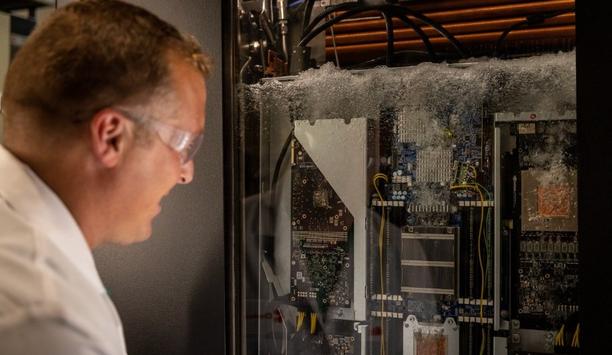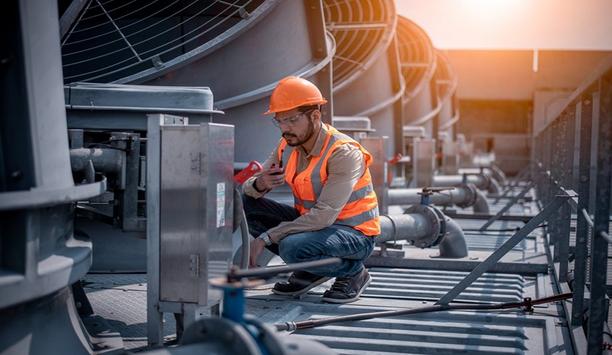Capacity - Expert Commentary
Data centers worldwide are under intense pressure. High-powered computing is a global necessity that seemingly gets more demanding by the day. There’s also the need to prioritize sustainability improvements ranging from resource conservation to decarbonization. And data centers must consider their bottom line and remain competitive. Anticipating the challenges data centers will continue to face, scientists and engineers have innovated two-phase (2-PIC) immersion cooling. With the capacit...
Until a couple of years ago, most of the talk about heat pumps occurred around this time of year, when more than half the planet prepares for an autumn cooldown. These discussions were typically limited to regions that only experienced moderate winters. But as anyone who has recently perused an HVACR trade magazine or website—or participated in an industry webinar, event, or social media conversation—can tell you, the topic of heat pumps is virtually unavoidable. Not only do heat p...
From temperate climates that reach mid-90 F in June and mild winters allowing people to be outdoors without jackets to the “May flowers” that bloom in early March, it’s evident that society is experiencing World Refrigeration Day’s 2024 theme: “Temperature matters.” In addition to driving climate change, global warming is driving changes in how people live and how industries adapt and innovate to support new dynamics. This is especially true for the HVACR Indu...
“Decarbonising home heating represents one of the biggest challenges to the government achieving net zero,” was a conclusion of the recent National Audit Office report ‘Decarbonising home heating’. The facts, the report states clearly in the opening are: 18% of the UK’s greenhouse gas emissions in 2021 were from home heating and 55,000 heat pumps were sold in the UK in 2022. decarbonizing home heating Crucial to decarbonizing home heating is the government&rsquo...
Refrigerant transitions are imperative to comply with evolving emissions regulations and decarbonization agendas. The dynamic landscape necessitates continual adaptation to meet current requirements, with further changes anticipated. However, switching refrigerants poses numerous HVAC/R system design hurdles, affecting system performance and component selection. Energy efficiency standards Energy efficiency standards are a paramount concern, driving innovation towards systems that perform we...
Nothing is immune to entropy. As buildings age, they suffer natural breakdowns in efficiency, performance, and useability, compromising occupant comfort and leading to higher energy bills. Luckily, they do not have to stay that way. Retro-commissioning brings existing structures up to speed so they can function their best. What Is Commissioning? Commissioning helps buildings operate as the owners intended and ensures staff maintains their equipment and systems. During new construct...
Using air conditioners and electric fans to stay cool accounts for nearly 20% of the total electricity used in buildings around the world, according to a report from the International Energy Agency. hybrid work model As a unique mix of key factors, such as the adoption of the hybrid work model and escalating heatwaves in certain regions of the United States keep people indoors for longer periods, this 20% share represents an increasingly costly line item on household budgets. Those within th...
As COVID-19 becomes endemic and hybrid working becomes the norm, a great deal of time and energy is going into managing a safe return to the office and a move to new styles of working. As hard FM systems are adjusted to suit new workplace expectations and futureproof sites, Johnpaul Pearson, Business Support Director at Anabas, talks about understanding workplaces and using technology to better design and plan a workplace of the future. Even before the COVID-19 pandemic struck, we were witnessi...
‘Energy storage holds the key to providing clean energy for heating and powering the home and reducing carbon emissions’ Carlton Cummins, CTO and Co-Founder of clean technology company Aceleron explain how this will work. As we transition away from natural gas and other fossil fuels, there is no question that we absolutely have to make better use of renewable energy. Using a battery energy storage system (BESS) combined with renewable technology such as solar means that it can be st...
Energy consumption continues to be one of the primary contributors to a building’s carbon emissions and its operational costs. Around 40% of this energy is used to power HVAC systems. To improve sustainability and reduce operating costs, it’s in a building owner’s best interest to find ways to make their building’s heating and cooling systems more efficient. Identifying areas that will make the biggest difference starts with knowing which systems consume the most energy...
AI (Artificial Intelligence) is a smart buildings’ biggest ally. Without it, a building could hardly be classed as smart. For building owners and managers, AI is imperative to create a secure and comfortable experience for their occupants every day. What a building platform should do is gather data from various sources from the building management system and other smart technologies, to gather it all in one place. The data should then be fed into a flexible, scalable cloud-based platform...
Even though the COVID-19 pandemic is seemingly drawing to a close, living, working and learning at home is set to continue. Under this new normal, home electricity use is expected to double by 2050. Simultaneously, as climate change devastates communities around the world, we are faced with a moral and economic obligation to cut CO2 emissions from houses. Our goal is to build Net Zero houses and we can't get there fast enough. Fossil fuels use in heating systems Many countries continue to rely...
Seasonal transitions are the perfect time to take inventory and inspect a building’s various systems. We’ve been reminded for years that when we set our clocks back, we should also replace the batteries in our smoke detectors. The same thought process can be applied in support of seasonal preventative maintenance for a building’s HVAC system. Now that the cooling season has passed for a large part of the country, it is time to ensure that HVAC systems have been shut down prope...
I am writing this the day after the Autumn Spending Review, which among many measures, included a huge focus on how the Government wants to ‘level up the country’, creating a new post-pandemic economy, with higher wages and higher skills. Part of this is the £500 million ‘Multiply’ scheme, which aims to increase numeracy and basic mathematics for adults in the United Kingdom via in person tutoring, digital training and flexible courses. Lack of basic skills to acce...
The development of digital technologies in the Heating, Ventilation and Air Conditioning (HVAC) sector has been transformational for the industry, as well as for those who run HVAC systems. While the electrification and digitalization of machines, and assets has made a lot of operations simpler, it has also meant that the collection of machine data has never been more critical. Given that engineers can now view lots of different metrics on a single screen, including things like heating control...
It is now more common to read about cases of Legionnaires’ disease in the media than ever before, with outbreaks regularly being reported in cities around the world, all the time. Many of these cases are attributed to contamination of domestic systems, showers and spas, but some are the result of operating cooling towers. While this problem is not new, with the first reported case in Philadelphia, in 1976, the United Kingdom (UK) has been at the forefront in leading the battle with Legionn...
The UK is the biggest boiler market in Europe, FACT. But the majority of heating system stock relies on gas systems – a whopping 85% are gas boilers which equate to about 1.5 million gas boilers being installed each year. Thanks to government measures and the world’s most innovative manufacturers, renewable heating is fast becoming a bit of a trend – though it’s vital to point out that still only 2% of the heating systems in the UK are represented by renewables. Heat p...
At the moment, it seems as though a day rarely goes by without low-carbon heating hitting the headlines. Whether it is reports of ‘revamping’ the Clean Heat Grant, to include a ‘boiler scrappage’ scheme, which may offer home owners up to £7000 to make the switch to a low-carbon alternative, to speculation that the Prime Minister is under pressure to push back the 2035 ban on gas boilers, the debate on how and when the low-carbon heating revolution will happen is ong...
In today’s world, we spend almost 90 per cent of our time indoors, in our workplaces, leisure areas and our homes. It is no secret that the built environment has been relatively slow in its embrace of information technology and automation. According to KPMG’s ‘Building a Technology Advantage’ report, fewer than 20 percent of construction and engineering executives, and major-project owners said they are re-thinking their business models, so as to incorporate new technolo...
A quick glance at official COVID-19 mitigation guidance reveals that it promotes increased ventilation air change rates, as the most effective way to keep people safe. Sounds easy, doesn’t it? Just open a window or turn up your ventilation system, if you have one. The fact is, however, that the vast majority of domestic properties in Britain does not have a mechanical ventilation system and rely on natural means for background ventilation, including windows, trickle vents or air bricks. In...
With the UK committed to reducing greenhouse gas emissions to zero by 2050, drastic action is needed by the government. For new-build homes, there’s a gas boiler ban coming in less than five years’ time. And for older properties, it’s likely that gas prices will continue to rise, to encourage homeowners to switch to a more sustainable alternative. Renewable heating market With this in mind, the renewable heating market is growing rapidly, albeit from a very small base &ndash...
The ongoing shortage of HVAC equipment and tools has created a significant challenge for contractors around the country. At the same time, companies are also up against intense environmental conditions, like the extreme winter weather that impacted much of Texas in early 2021. The right strategies can help HVAC businesses navigate this shortage and make the most of the equipment they can order. Due to the lingering effects of the COVID-19 pandemic, raw material and component shortages have disr...
The energy transition is upon us and we are shifting today’s energy use to low and zero carbon sources. The way in which we heat and provide hot water to our homes and businesses will change, and we are developing technologies that will support this transition. A bold and pragmatic policy framework will encourage investment and drive change. BEIS Hydrogen Strategy We, therefore, welcome the publication of the Hydrogen Strategy from the Department for Business, Energy & Industrial Str...
Most people spend about 90 percent of their time indoors. For home owners, indoor environmental quality (IEQ) is the most meaningful differentiator between ‘high-performance’ and ‘code-built’ homes. Indoor environmental quality IEQ describes how well the indoor environment promotes occupant comfort and health. The components of IEQ include thermal comfort, indoor air quality (IAQ), sound and lighting. Requirements for optimal IEQ vary per occupant and household, d...
As our urban centers grow, so does our demand for key resources, such as energy. Currently, cities are accountable for over 60% of resource use and an estimated 70% of global carbon emissions. In the Middle East particularly, countries have experienced unprecedented population growth, increased economic activity and consequently, increases in energy consumption. Integration of sustainable systems Fortunately, industry leaders and governments are placing sustainability at the heart of regional...
Post-COVID workplaces will inevitably look different. Changes to working patterns will drive more agile and sociable workplace design. But regulations must keep up with developments. In late January, the UK Government proposed the ‘future of buildings standards’. These proposed updates come at a time when many landlords and site managers will be contemplating changes in response to altered workplace use and demand. As workplaces begin to reopen, organizations have an opportunity to i...
With ongoing efforts from governments across the globe to reduce carbon emissions and with an ever greater focus on sustainability, it is vital that the HVAC sector does its part in becoming more environmentally conscious. And, while there have been steps to become more sustainable, there is a huge amount that still needs to be done to make sure that many of the targets that have been set are attainable. In buildings, both large and small, industrial heating accounts for roughly two thirds of i...
The education field was faced with multiple challenges this past year. Not only did the COVID-19 pandemic bring the necessity of online learning, but it has also brought up necessary changes to physical schools and universities, when reopening time arrives. The health and safety of students, staff, and faculty has become a priority for directors of school operations, who have been working to properly adapt school facilities to this new reality we are facing. Ensuring health and safety of studen...
Do HVAC systems help with the spread of COVID-19? No one is entirely sure, but it seems very likely. Especially in the case of enclosed indoor spaces. As soon as the COVID-19 pandemic began, fingers pointed to air-conditioning systems as culprits, and scientists now believe a super-spreader event traced back to a restaurant in Guangzhou, in China, which could have started with an asymptomatic person who just happened to cough close to an HVAC fan. Scientists also believe something similar happe...
In the coming decades, the government plans to phase out gas and oil boilers and replace them with renewable heating systems. To make this possible, to give us a shot of achieving net-zero carbon emissions by 2050, more people need to train as renewable heating installers. But when you were a teenager, if old people like Boris Johnson or George Eustice had told you that you ‘should’ choose a certain career, would you have listened? No, me neither. Yes, there will be plenty of enviro...
Leveraging Radiant And Hydronics To Help Achieve Decarbonization Goals
DownloadSealed Connectors In Harsh Environments
DownloadPowering And Cooling Next Generation Data Centers
DownloadDebunking Myths To Promote A Bright Future For Heat Pumps
DownloadOptimizing Comfort: The Ultimate HVAC Component Guide
Download


































